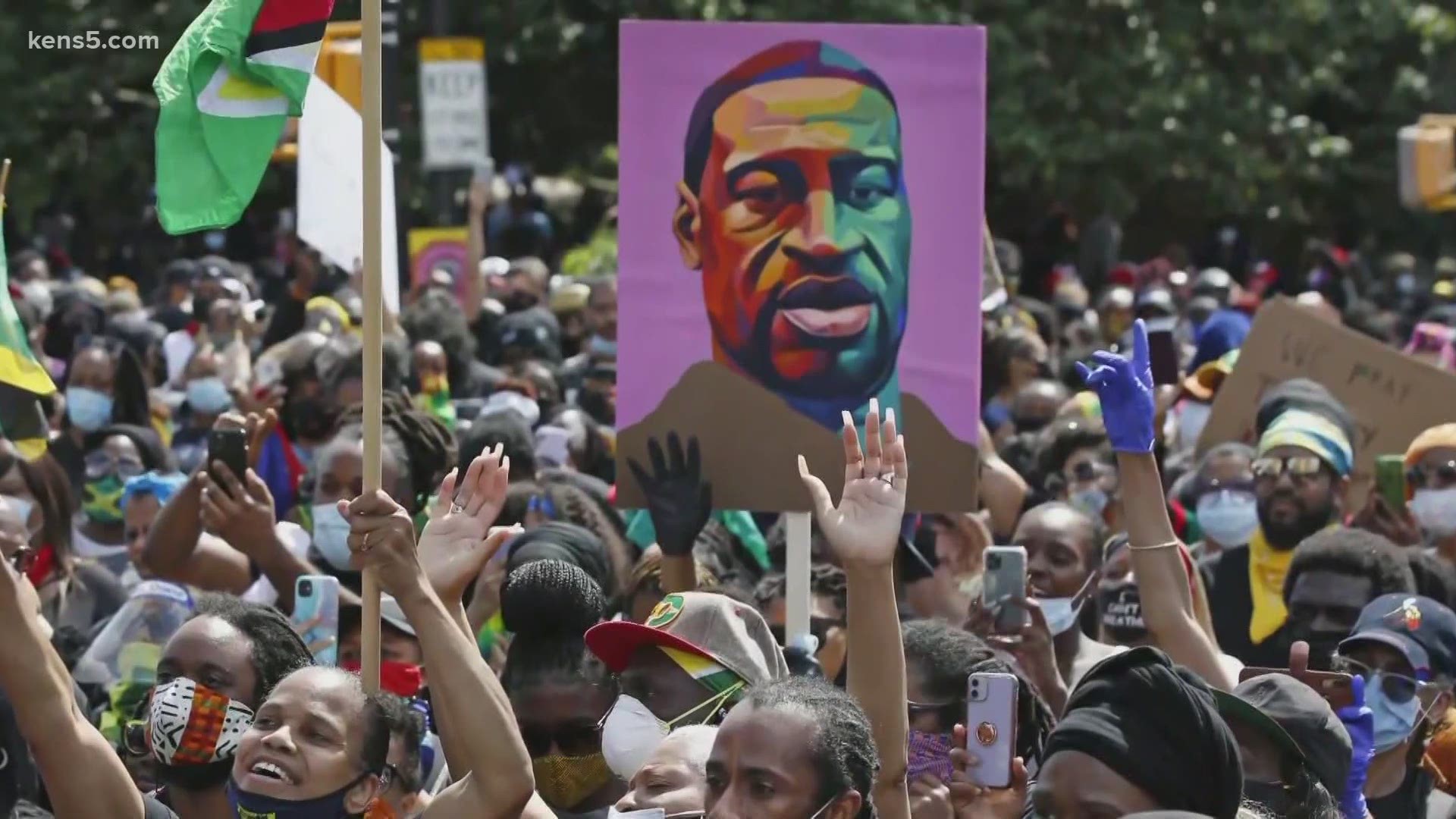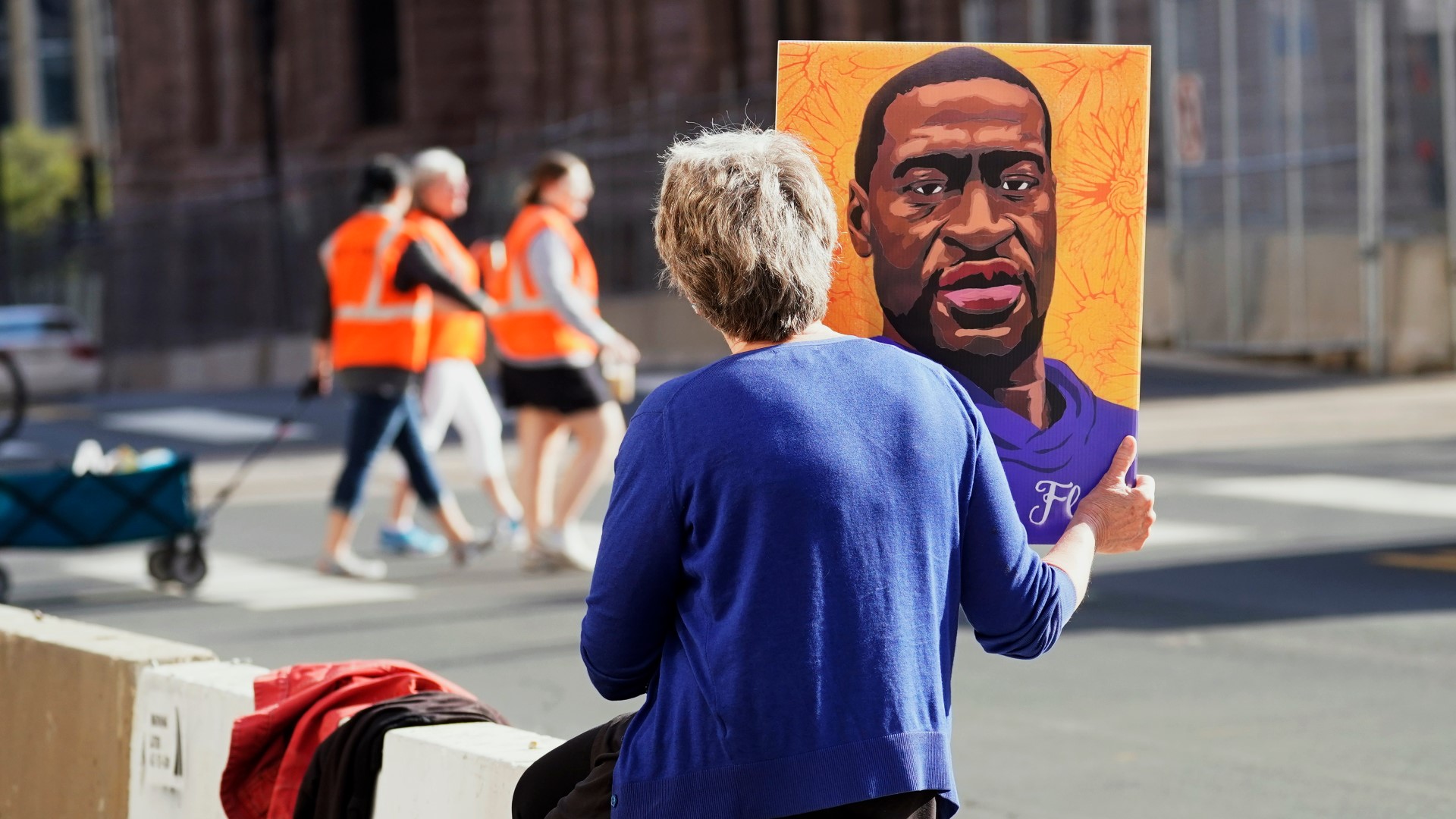Law and race matter for the upcoming George Floyd verdict | Together We Rise
Prosecutors are trying to prove the former officer Derek Chauvin killed George Floyd with a controversial tactic. Many believe race drove him to cross the line.

"Race is the story"
Not since the O.J. Simpson trial has there been so much anticipation about a criminal trial verdict. The country is watching the case against former Minneapolis police officer Derek Chauvin for unintentional murder and manslaughter.
"It's always a difficult thing to address race in a criminal trial," Donna Coltharp said.
But law and race are on trial too. Former Federal public defender and current St. Mary's Law School criminal law professor Donna Coltharp agrees.
"Race is the story in the Minnesota trial," she said.
Putting race on the witness stand, she said, does not frequently happen because of the burden of proof.
"We don't usually litigate a societal matter, systemic problems in criminal trial because we want to be sure we keep the focus on the defendant," Coltharp said. "Whether he committed the crime that he's been accused of."
According to Coltharp, the Supreme Court requires evidence of intentional racial motivation before trying it in a courtroom. 'They had a bad heart,' she said.
"It's extraordinarily hard to prove that a person has a bad heart," Coltharp said. "I can't think of anything that a person would less like to be guilty of. So, they fight back pretty hard."
Nearly 30 members of the St. Mary's Law School's Student Bar Association (SBA) took an immediate stand following Floyd's death in a statement on June 2, 2020.
"...The SBA condemns acts of racism. As students with future professions in the legal community, it is on us to utilize the privileges that we have to stand with and support marginalized and underrepresented communities. The SBA stands in complete solidarity with communities of color to end racism."
Their views have not changed about the nine-minute and 29-second video that shook the globe.
"I think we want to treat everybody the same. But in reality---that's just not what we've seen in the past few years," Everarado 'Eddie' Villarreal said.
The third-year law student from Weslaco believes in the law's power and its potential for accountability, as demonstrated in the Chauvin trial.
"This kind of trial demonstrates that no one is really above the law," he said.
Crystal Andrade, also a third-year law student, is the SBA president.
"It's almost inevitable that we don't see the intersection between law and race," Andrade said.
The Laredo native said a lot is hinging on the outcome of this trial.
"There's more to come. There are other officers that will be facing trial," she said.
Ondrejia Scott is from San Antonio's eastside. She is in her second year at St. Mary's Law School.
The 27-year-old is no stranger to officers accused of killing.
"I went to middle school with someone who was killed by an officer at a gas station," Scott said. "This is something I was exposed to as early as 12-years-old."
Scott said she also saw drive-bys and people whose lives got taken by her neighbors.
"I think this is going to be a great time to---one---watch this case play out and see how the law treats this act," Scott said.'
"The experiences that jurors have are---pardon the expression---whitewashed experiences"
Andrade said from where she sits, the public's view of the Chauvin trial is all about race.
"You're waiting on this one and holding your breath to see what's going to happen," she said.
Coltharp said even if Chauvin gets painted as a person who does not treat people of color well, it does not mean he intentionally or recklessly killed Floyd.
She also said officers walk in carrying the trust of jurors that's like capital in the bank.
"I was acting in the line of duty. I was protecting you, you law-abiding jurors," Coltharp said. "And this criminal defendant colored outside the lines in some way that I had to behave in a way that I didn't want to behave. But my job required it."
Floyd got accused of trying to pass off counterfeit money to a corner store. Chauvin and other officers responded to that situation which evolved into his death.
"The experiences that jurors have are---pardon the expression---whitewashed experiences," the law professor said. "They're not informed by a broad understanding of all communities."
According to Coltharp, the officer is always easier to defend. She also said strong suspicion local District Attornies favor police officers, especially in the grand jury's law-protected secretive proceedings.
"If we're going to have communities that trust the results that they're asked to swallow," she said. "Then they should be able to look at what happened."
The law students agree and support removing the cloak grand jury proceedings.
"We have a moral obligation as citizens of this country to have each other's back," Scott said. "And if there are faults in the legal system or communities, that we can find ways to create solutions and more importantly that we are able to see justice prevail."
Prosecutors work with police to bring offenders to justice. But sometimes, she said, the political power of a police union could affect an outcome.
"Justice is supposed to be blind"
"They have an interest in who the local DA is," she said. "Once the local DA is in place, they have an interest in what the local DA prosecutes---what the local DA takes seriously."
Justice is supposed to be blind. Instead, Coltharp said justice could track the hue of pigmentation.
"We all respond more negatively to people the darker their skin is---across the board," she said. "All of us."
She said jurors are sympathetic to an officer's duty and its danger.
"When jurors look at people of color and when judges look at people of color---there are several things that they are not able to do as well as they can with people who look like them," Coltharp said.
One example is understanding why an inner-city youth carrying a gun at 16-years-old for protection is acceptable.
"A white juror is going to have a really hard time with that even if they've got a second amendment flag in their front yard," she said.
"People are looking at this case as the moment in which we pivot"
Even so, Coltharp believes now more than ever; people are willing to listen to a narrative in which people of color are hurt and killed by police.
"I think the answer we get is going to tell us a lot about how people view law and race," Villarreal said.
The 28-year-old said after stripping away titles, backgrounds, race, and character, there is a critical question in this trial: 'Is he responsible for the death of another person?'
"A lot of people are looking at this case as the moment in which we pivot, and something that more closely approximates justice for everybody comes out the courtroom door," Coltharp said. "If that doesn't happen, there's going to be profound disappointment."


